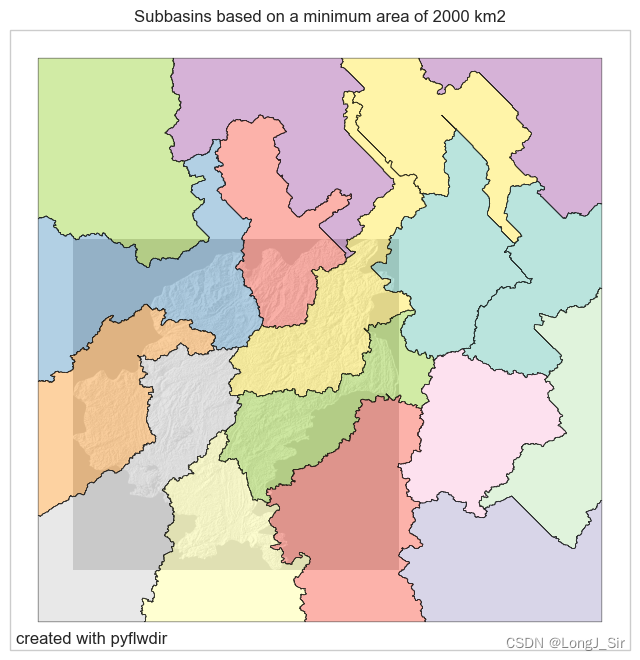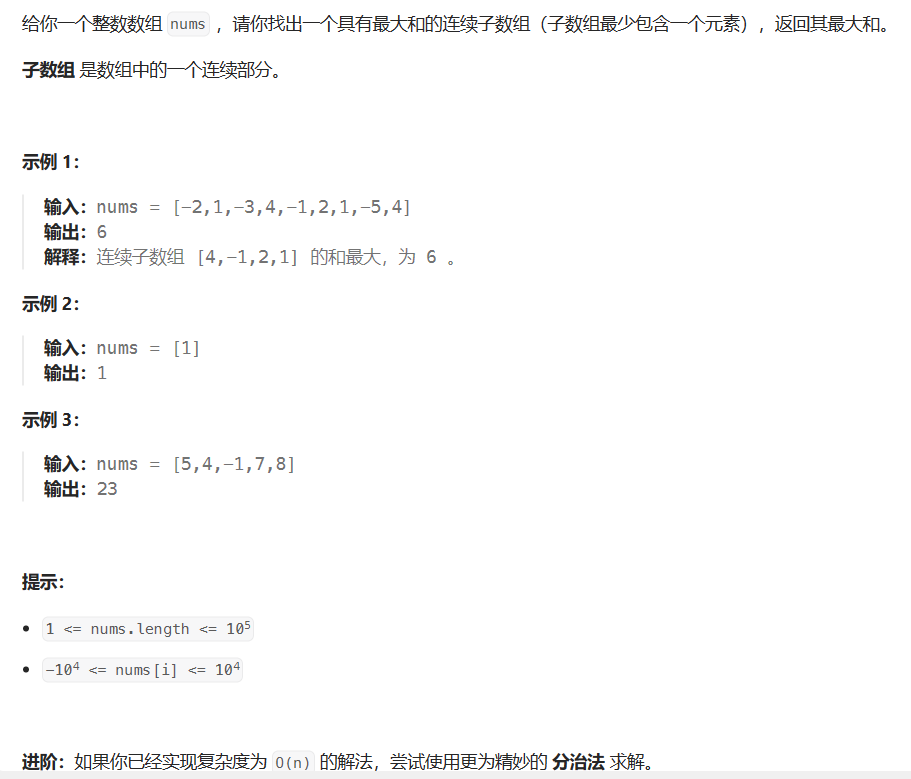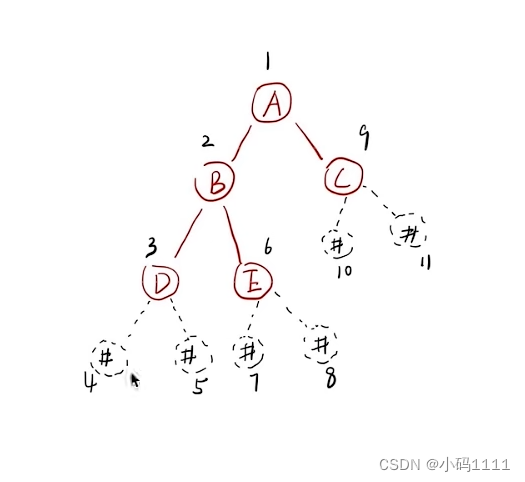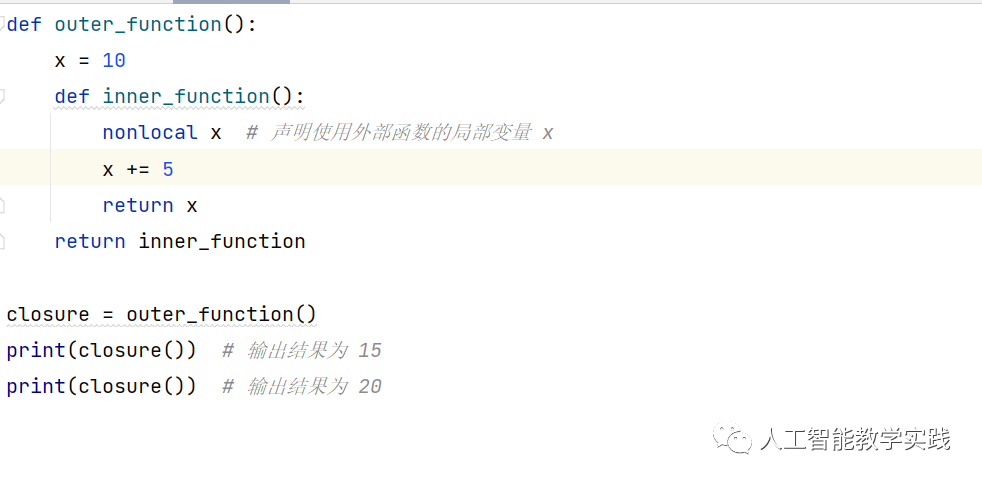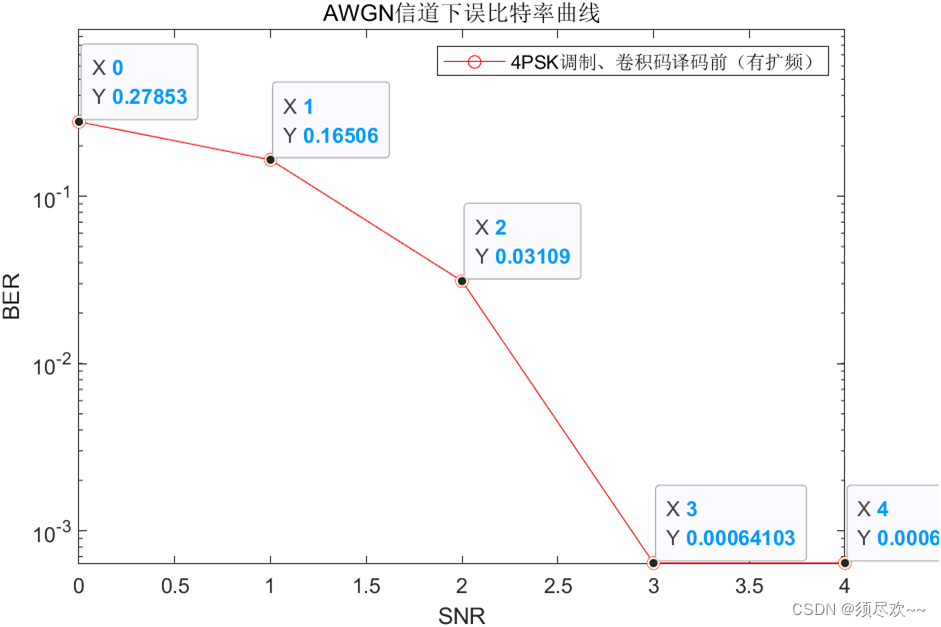目录
一 . 底层结构--哈希
1.直接定址法
2. 除留余数法 + 哈希桶
3. 一些定义
二 . 模拟实现哈希表
1.哈希表框架
编辑
2.插入
3.查找
4 . 删除
5.解决使用问题
6.完整代码
三 .实现unordered_map, unordered_set
1. 初步实现unordered_map, unordered_set
2.加上迭代器(自行理解)
3.测试用例
一 . 底层结构--哈希
哈希思想:构造一种存储结构,通过某种函数(hashFunc)使元素的存储位置与它的关键码之间能够建立一一映射的关系,那么在查找时通过该函数可以很快找到该元素。
哈希方法构造出来的结构称为哈希表(Hash Table)(或者称散列表)
1.直接定址法

2. 除留余数法 + 哈希桶
如果数据过多,并且数据很散,直接定址法不适合。
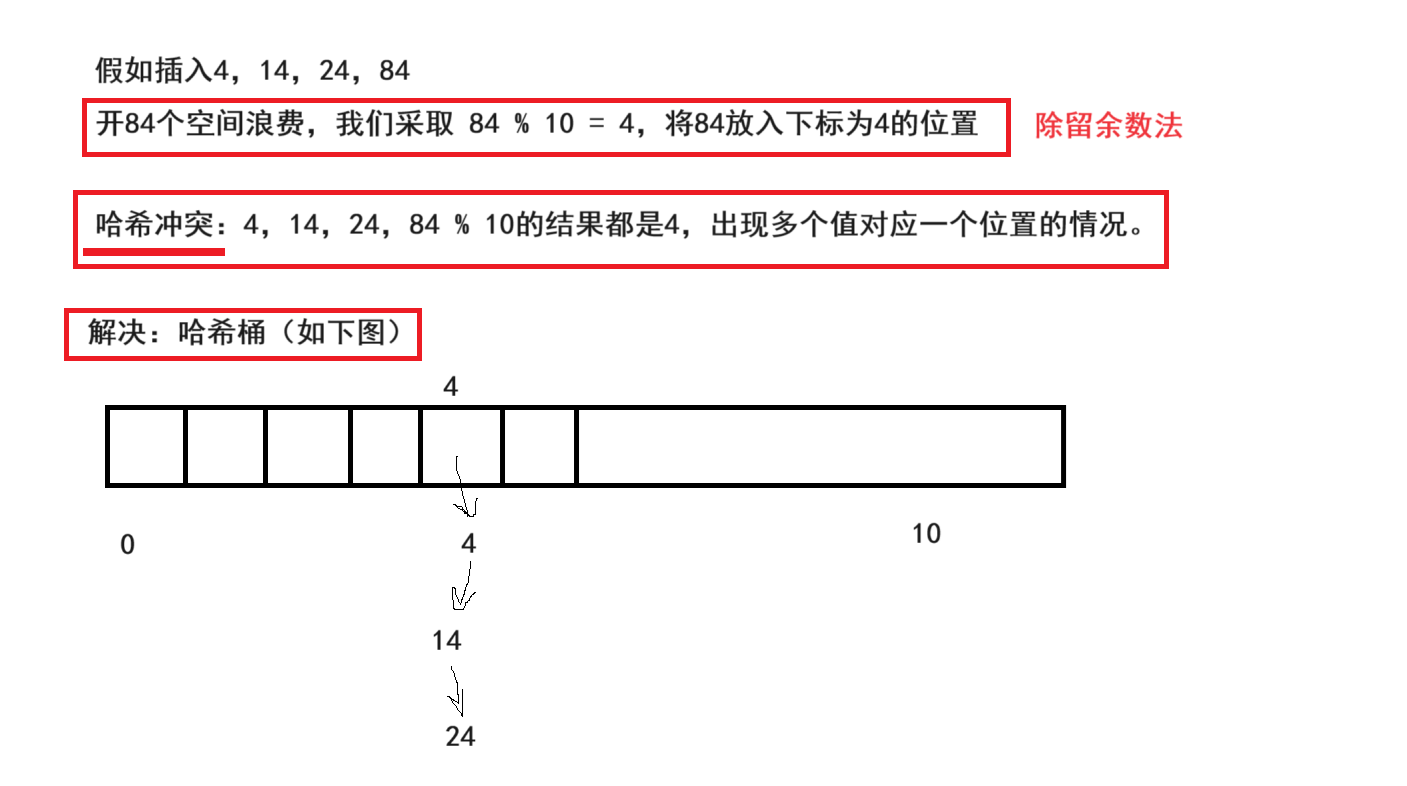
3. 一些定义
不同关键字(4,14,24,84)通过相同的方法(% 10)计算出相同的哈希地址,该种现象称为哈希冲突或哈希碰撞。
解决哈希冲突两种常见的方法是:闭散列和开散列
闭散列:也叫开放定址法,当发生哈希冲突时,如果哈希表未被装满,说明在哈希表中必然还有
空位置,那么可以把key存放到冲突位置中的“下一个” 空位置中去
开散列法又叫链地址法(开链法):首先对关键码集合用散列函数计算散列地址,具有相同地
址的关键码归于同一子集合,每一个子集合称为一个桶,各个桶中的元素通过一个单链表链
接起来,各链表的头结点存储在哈希表中。
(我们采用的是开散列法)
二 . 模拟实现哈希表
1.哈希表框架
代码:
//节点
template<class K, class V>
struct HashNode
{
HashNode(const pair<K, V>& kv)
:_kv(kv)
, _next(nullptr)
{}
pair<K, V> _kv;
HashNode<K, V>* _next;
};
template<class K, class V>
{
typedef HashNode<K, V> Node;
public:
HashTable()
{
_tables.resize(10, nullptr);
}
~HashTable()
{
for (size_t i = 0; i < _tables.size(); i++)
{
Node* cur = _tables[i];
while (cur)
{
Node* next = cur->_next;
delete cur;
cur = next;
}
}
}
//删除
//插入
//查找
private:
vector<Node*> _tables;
size_t _n = 0; // 哈希表实际元素个数
}_n存在的意义:判断_tables什么时候扩容。
开散列最好的情况是:每个哈希桶中刚好挂一个节点,再继续插入元素时,每一次都会发生哈希冲突,因此,在元素个数刚好等于桶的个数时,可以给哈希表增容。
2.插入
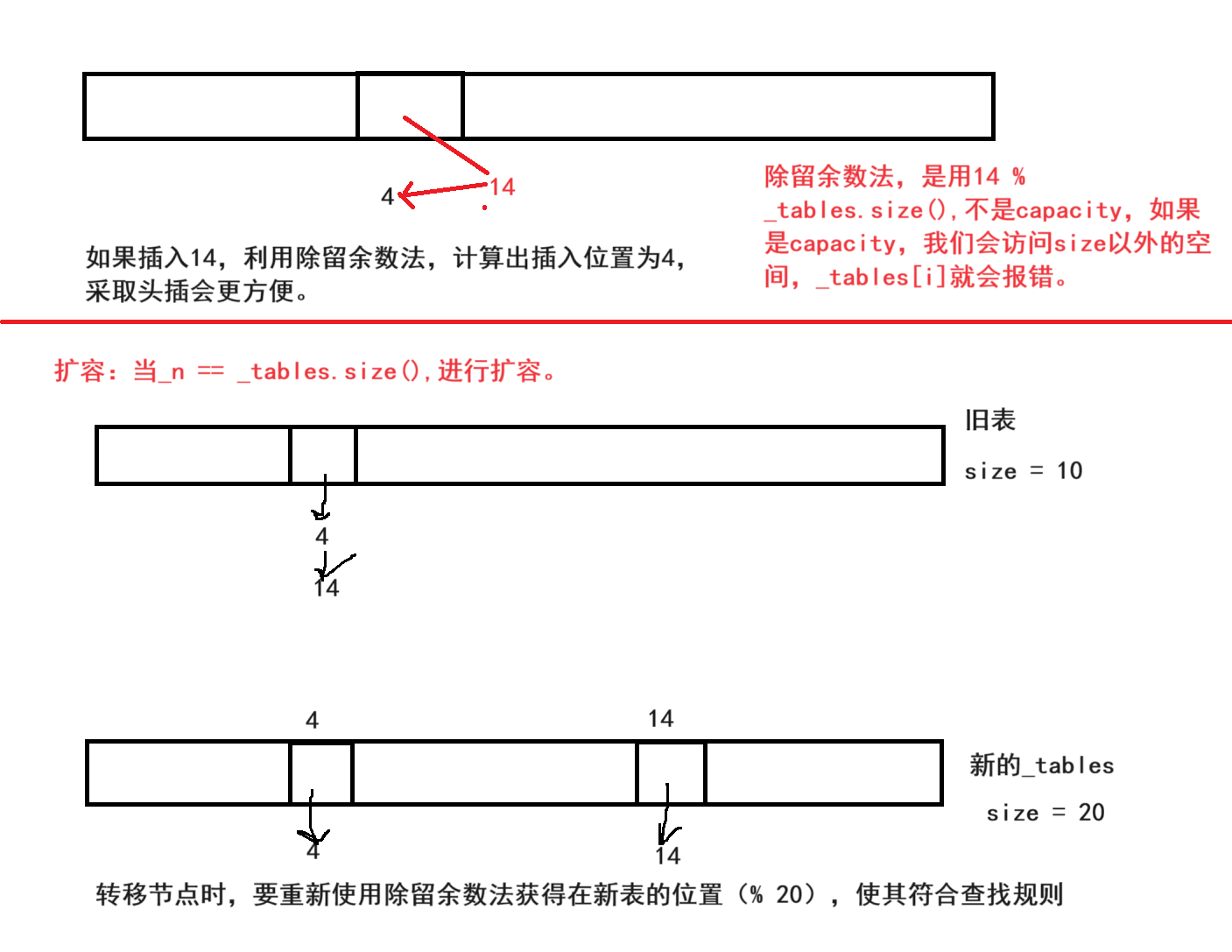
bool Insert(const pair<K, V>& kv)
{
if(Find(kv.first))
return false;
//扩容
if (_n / _tables.size() == 1)
{
size_t newSize = _tables.size() * 2;
vector<Node*> newTables;
newTables.resize(newSize, nullptr);
for (size_t i = 0; i < _tables.size(); i++)
{
Node* cur = _tables[i];
while (cur)
{
size_t hashi = cur->_kv.first % newTables.size();
cur->_next = newTables[hashi];
newTables[hashi] = cur;
}
_tables[i] = nullptr;
}
_tables.swap(newTables);
}
size_t hashi = kv.first % _tables.size();
Node* newnode = new Node(kv);
newnode->_next = _tables[hashi];
_tables[hashi] = newnode;
_n++;
return false;
}3.查找
Node* Find(const K& key)
{
size_t hashi = key % _tables.size();//找到插入位置
Node* cur = _tables[hashi];
while (cur)
{
if (cur->_kv.first == key)
{
return cur;
}
cur = cur->_next;
}
return nullptr;
}4 . 删除
bool erase(const K& key)
{
size_t hashi = key % _tables.size();
Node* cur = _tables[hashi];
Node* prev = nullptr;
if (cur->_kv.first == key)
{
_tables[hashi] = nullptr;
return true;
}
while (cur)
{
if (cur->_kv.first == key)
{
prev->_next = cur->_next;
delete cur;
return true;
}
prev = cur;
cur = cur->_next;
}
return false;
}5.解决使用问题


如果kv.first为string或者其他类型,就会出问题。
解决:
template<class K>
struct HashFunc
{
size_t operator()(const K& key)
{
return (size_t)key;
}
};
template<>
struct HashFunc<string>
{
size_t operator()(const string& key)
{
size_t sum = 0;
for (auto& e : key)
{
sum *= 31;
sum += e;
}
return sum;
}
};接着把所有用除留余数法的部分进行修改:


6.完整代码
#pragma once
template<class K, class V>
struct HashNode
{
HashNode(const pair<K, V>& kv)
:_kv(kv)
, _next(nullptr)
{}
pair<K, V> _kv;
HashNode<K, V>* _next;
};
template<class K>
struct HashFunc
{
size_t operator()(const K& key)
{
return (size_t)key;
}
};
template<>
struct HashFunc<string>
{
size_t operator()(const string& key)
{
size_t sum = 0;
for (auto& e : key)
{
sum *= 31;
sum += e;
}
return sum;
}
};
//哈希桶
template<class K, class V, class Hash = HashFunc<K>>
class HashTable
{
typedef HashNode<K, V> Node;
Hash hf;
public:
HashTable()
{
_tables.resize(10, nullptr);
}
~HashTable()
{
for (size_t i = 0; i < _tables.size(); i++)
{
Node* cur = _tables[i];
while (cur)
{
Node* next = cur->_next;
delete cur;
cur = next;
}
}
}
bool Insert(const pair<K, V>& kv)
{
if(Find(kv.first))
return false;
//扩容
if (_n / _tables.size() == 1)
{
size_t newSize = _tables.size() * 2;
vector<Node*> newTables;
newTables.resize(newSize, nullptr);
for (size_t i = 0; i < _tables.size(); i++)
{
Node* cur = _tables[i];
while (cur)
{
size_t hashi = hf(cur->_kv.first) % newTables.size();
cur->_next = newTables[hashi];
newTables[hashi] = cur;
}
_tables[i] = nullptr;
}
_tables.swap(newTables);
}
size_t hashi = hf(kv.first) % _tables.size();
Node* newnode = new Node(kv);
newnode->_next = _tables[hashi];
_tables[hashi] = newnode;
_n++;
return false;
}
Node* Find(const K& key)
{
size_t hashi = hf(key) % _tables.size();
Node* cur = _tables[hashi];
while (cur)
{
if (cur->_kv.first == key)
{
return cur;
}
cur = cur->_next;
}
return nullptr;
}
bool erase(const K& key)
{
size_t hashi = hf(key) % _tables.size();
Node* cur = _tables[hashi];
Node* prev = nullptr;
if (cur->_kv.first == key)
{
_tables[hashi] = nullptr;
return true;
}
while (cur)
{
if (cur->_kv.first == key)
{
prev->_next = cur->_next;
delete cur;
return true;
}
prev = cur;
cur = cur->_next;
}
return false;
}
private:
vector<Node*> _tables;
size_t _n = 0;
};三 .实现unordered_map, unordered_set
1. 初步实现unordered_map, unordered_set
这部分内容类似红黑树封装map,set。
unordered_set.h
#pragma once
template<class K, class Hash = HashFunc<K>>
class unordered_set
{
struct KeyOfT
{
const K& operator()(const K& key)
{
return key;
}
};
public:
bool insert(const K& key)
{
return _ht.Insert(key);
}
bool erase(const K& key)
{
return _ht.Erase(key);
}
HashNode<K>* find(const K& key)
{
return _ht.Find(key);
}
private:
HashTable<K, K, KeyOfT> _ht;
};unordered_map.h
#pragma once
template<class K, class V, class Hash = HashFunc<K>>
class unordered_map
{
struct KeyOfT
{
const K& operator()(const pair<K, V>& kv)
{
return kv.first;
}
};
public:
bool insert(const pair<K, V>& key)
{
return _ht.Insert(key);
}
bool erase(const K& key)
{
return _ht.Erase(key);
}
HashNode<pair<K, V>>* find(const K& key)
{
return _ht.Find(key);
}
private:
HashTable<K, pair<K, V>, KeyOfT> _ht;
};HashTable.h
#pragma once
template<class T>
struct HashNode
{
HashNode(const T& data)
:_data(data)
, _next(nullptr)
{}
T _data;
HashNode<T>* _next;
};
template<class K>
struct HashFunc
{
size_t operator()(const K& key)
{
return (size_t)key;
}
};
template<>
struct HashFunc<string>
{
size_t operator()(const string& key)
{
size_t sum = 0;
for (auto& e : key)
{
sum *= 31;
sum += e;
}
return sum;
}
};
//哈希桶
template<class K, class T, class KeyOfT>
class HashTable
{
typedef HashNode<T> Node;
HashFunc<K> hf;
KeyOfT kot;
public:
HashTable()
{
_tables.resize(10, nullptr);
}
~HashTable()
{
for (size_t i = 0; i < _tables.size(); i++)
{
Node* cur = _tables[i];
while (cur)
{
Node* next = cur->_next;
delete cur;
cur = next;
}
}
}
bool Insert(const T& data)
{
if(Find(kot(data)))
return false;
//扩容
if (_n / _tables.size() == 1)
{
size_t newSize = _tables.size() * 2;
vector<Node*> newTables;
newTables.resize(newSize, nullptr);
for (size_t i = 0; i < _tables.size(); i++)
{
Node* cur = _tables[i];
while (cur)
{
size_t hashi = hf(kot(cur->_data)) % newTables.size();
cur->_next = newTables[hashi];
newTables[hashi] = cur;
}
_tables[i] = nullptr;
}
_tables.swap(newTables);
}
size_t hashi = hf(kot(data)) % _tables.size();
Node* newnode = new Node(data);
newnode->_next = _tables[hashi];
_tables[hashi] = newnode;
_n++;
return false;
}
Node* Find(const K& key)
{
size_t hashi = hf(key) % _tables.size();
Node* cur = _tables[hashi];
while (cur)
{
if (kot(cur->_data) == key)
{
return cur;
}
cur = cur->_next;
}
return nullptr;
}
bool Erase(const K& key)
{
size_t hashi = hf(key) % _tables.size();
Node* cur = _tables[hashi];
Node* prev = nullptr;
if (kot(cur->_data) == key)
{
_tables[hashi] = nullptr;
return true;
}
while (cur)
{
if (kot(cur->_data) == key)
{
prev->_next = cur->_next;
delete cur;
return true;
}
prev = cur;
cur = cur->_next;
}
return false;
}
private:
vector<Node*> _tables;
size_t _n = 0;
};2.加上迭代器(自行理解)
unordered_map.h
#pragma once
template<class K, class V, class Hash = HashFunc<K>>
class unordered_map
{
struct KeyOfT
{
const K& operator()(const pair<K, V>& kv)
{
return kv.first;
}
};
public:
typedef typename HashTable<K, pair<const K, V>, KeyOfT, Hash>::iterator iterator;
iterator begin()
{
return _ht.begin();
}
iterator end()
{
return _ht.end();
}
pair<iterator, bool> insert(const pair<K, V>& kv)
{
return _ht.Insert(kv);
}
V& operator[](const K& key)
{
pair<iterator, bool> ret = _ht.Insert(make_pair(key, V()));
return ret.first->second;
}
const V& operator[](const K& key) const
{
pair<iterator, bool> ret = _ht.Insert(make_pair(key, V()));
return ret.first->second;
}
iterator find(const K& key)
{
return _ht.Find(key);
}
bool erase(const K& key)
{
return _ht.Erase(key);
}
private:
HashTable<K, pair<const K, V>, KeyOfT, Hash> _ht;
};unordered_set.h
#pragma once
template<class K, class Hash = HashFunc<K>>
class unordered_set
{
struct KeyOfT
{
const K& operator()(const K& key)
{
return key;
}
};
public:
typedef typename HashTable<K, K, KeyOfT, Hash>::const_iterator iterator;
typedef typename HashTable<K, K, KeyOfT, Hash>::const_iterator const_iterator;
const_iterator begin() const
{
return _ht.begin();
}
const_iterator end() const
{
return _ht.end();
}
pair<const_iterator, bool> insert(const K& key)
{
auto ret = _ht.Insert(key);
return pair<const_iterator, bool>(const_iterator(ret.first._node, ret.first._pht, ret.first._hashi), ret.second);
}
iterator find(const K& key)
{
return _ht.Find(key);
}
private:
HashTable<K, K, KeyOfT, Hash> _ht;
};HashTable.h
#pragma once
template<class T>
struct HashNode
{
HashNode(const T& data)
:_data(data)
, _next(nullptr)
{}
T _data;
HashNode<T>* _next;
};
template<class K>
struct HashFunc
{
size_t operator()(const K& key)
{
return (size_t)key;
}
};
template<>
struct HashFunc<string>
{
size_t operator()(const string& key)
{
size_t sum = 0;
for (auto& e : key)
{
sum *= 31;
sum += e;
}
return sum;
}
};
//前置声明
template<class K, class T, class KeyOfT, class Hash>
class HashTable;
//迭代器
template<class K, class T, class Ref, class Ptr, class KeyOfT, class Hash = HashFunc<K>>
struct _HTIterator
{
typedef HashNode<T> Node;
typedef _HTIterator<K, T, Ref, Ptr, KeyOfT, Hash> Self;
Node* _node;
size_t _hashi;
const HashTable<K, T, KeyOfT, Hash>* _pht;
_HTIterator(Node* node, HashTable<K, T, KeyOfT, Hash>* pht, size_t hashi)
:_node(node)
, _hashi(hashi)
, _pht(pht)
{}
_HTIterator(Node* node, const HashTable<K, T, KeyOfT, Hash>* pht, size_t hashi)
:_node(node)
, _hashi(hashi)
, _pht(pht)
{}
Self& operator++()
{
if (_node->_next)
{
_node = _node->_next;
}
else//需要哈希表
{
++_hashi;
while (_hashi < _pht->_tables.size())
{
if (_pht->_tables[_hashi])
{
_node = _pht->_tables[_hashi];
break;
}
++_hashi;
}
if (_hashi == _pht->_tables.size())
{
_node = nullptr;
}
}
return *this;
}
bool operator!=(const Self& s)
{
return _node != s._node;
}
Ref operator*()
{
return _node->_data;
}
Ptr operator->()
{
return &(_node->_data);
}
};
//哈希桶
template<class K, class T, class KeyOfT, class Hash = HashFunc<K>>
class HashTable
{
public:
typedef HashNode<T> Node;
//为了访问HashTable的私有成员
template<class K, class T, class Ref, class Ptr, class KeyOfT, class Hash>
friend struct _HTIterator;
typedef _HTIterator<K, T, T&, T*, KeyOfT, Hash> iterator;
typedef _HTIterator<K, T, const T&, const T*, KeyOfT, Hash> const_iterator;
Hash hf;
KeyOfT kot;
HashTable()
{
_tables.resize(10, nullptr);
}
~HashTable()
{
for (size_t i = 0; i < _tables.size(); i++)
{
Node* cur = _tables[i];
while (cur)
{
Node* next = cur->_next;
delete cur;
cur = next;
}
}
}
iterator begin()
{
for (size_t i = 0; i < _tables.size(); i++)
{
if (_tables[i])
{
return iterator(_tables[i], this, i);
}
}
return end();
}
iterator end()
{
return iterator(nullptr, this, -1);
}
const_iterator begin() const
{
for (size_t i = 0; i < _tables.size(); i++)
{
if (_tables[i])
{
return const_iterator(_tables[i], this, i);
}
}
return end();
}
const_iterator end() const
{
return const_iterator(nullptr, this, -1);
}
pair<iterator, bool> Insert(const T& data)
{
iterator it = Find(kot(data));
if (it != end())
return make_pair(it, false);
//扩容
if (_n / _tables.size() == 1)
{
size_t newSize = _tables.size() * 2;
vector<Node*> newTables;
newTables.resize(newSize, nullptr);
for (size_t i = 0; i < _tables.size(); i++)
{
Node* cur = _tables[i];
while (cur)
{
size_t hashi = hf(kot(cur->_data)) % newTables.size();
cur->_next = newTables[hashi];
newTables[hashi] = cur;
}
_tables[i] = nullptr;
}
_tables.swap(newTables);
}
size_t hashi = hf(kot(data)) % _tables.size();
Node* newnode = new Node(data);
newnode->_next = _tables[hashi];
_tables[hashi] = newnode;
_n++;
return make_pair(iterator(newnode, this, hashi), true);
}
iterator Find(const K& key)
{
size_t hashi = hf(key) % _tables.size();
Node* cur = _tables[hashi];
while (cur)
{
if (kot(cur->_data) == key)
{
return iterator(cur, this, hashi);
}
cur = cur->_next;
}
return end();
}
bool Erase(const K& key)
{
size_t hashi = hf(key) % _tables.size();
Node* cur = _tables[hashi];
Node* prev = nullptr;
if (kot(cur->_data) == key)
{
_tables[hashi] = nullptr;
return true;
}
while (cur)
{
if (kot(cur->_data) == key)
{
prev->_next = cur->_next;
delete cur;
return true;
}
prev = cur;
cur = cur->_next;
}
return false;
}
private:
vector<Node*> _tables;
size_t _n = 0;
};3.测试用例
#include<iostream>
#include<vector>
#include<string>
#include<assert.h>
#include<utility>
using namespace std;
#include"HashTable.h"
#include"myunordered_set.h"
#include"myunordered_map.h"
void test()
{
//HashTable<string, int> ht;
//ht.Insert(make_pair("西瓜", 1));
//HashNode<string, int>* ret = ht.Find("西瓜");
//ret->_kv.second++;
//cout << ret->_kv.first << ":" << ret->_kv.second << endl;;
//ht.Insert(make_pair("桃子", 1));
//ht.Insert(make_pair("桃子", 2));
//ht.Insert(make_pair("苹果", 1));
}
//void testset()
//{
// unordered_set<string> us;
// us.insert("西瓜");
// us.insert("香蕉");
// us.insert("苹果");
// us.insert("西瓜");
//
// us.erase("西瓜");
// HashNode<string>* ret = us.find("香蕉");
// cout << ret->_data << endl;
//}
//void testmap()
//{
// string arr[] = { "西瓜", "香蕉", "西瓜", "苹果", "西瓜", "西瓜", "香蕉", "西瓜" };
// unordered_map<string, int> up;
// for (auto e : arr)
// {
// HashNode<pair<string, int>>* ret = up.find(e);
// if (ret)
// {
// ret->_data.second++;
// cout << ret->_data.first << ":" << ret->_data.second << endl;
//
// }
// else
// {
// up.insert(make_pair(e, 1));
// }
// }
//
//}
void test_set()
{
// 17:05
unordered_set<int> us;
us.insert(5);
us.insert(15);
us.insert(52);
us.insert(3);
unordered_set<int>::iterator it = us.begin();
while (it != us.end())
{
cout << *it << " ";
++it;
}
cout << endl;
for (auto e : us)
{
cout << e << " ";
}
cout << endl;
}
void test_map()
{
//unordered_map<string, string> dict;
//dict.insert(make_pair("sort", ""));
//dict.insert(make_pair("string", "ַ"));
//dict.insert(make_pair("insert", ""));
//for (auto& kv : dict)
//{
// //kv.first += 'x';
// kv.second += 'x';
// cout << kv.first << ":" << kv.second << endl;
//}
//cout << endl;
string arr[] = { "西瓜", "苹果", "苹果", "胡萝卜", "梨子", "橘子", "哈密瓜", "桃子", "西瓜", "西瓜", "梨子" };
unordered_map<string, int> count_map;
for (auto& e : arr)
{
count_map[e]++;
}
for (auto& kv : count_map)
{
cout << kv.first << ":" << kv.second << endl;
}
cout << endl;
}
int main()
{
//test();
//testset();
//testmap();
//test_set();
test_map();
return 0;
}



![[Kettle] 单变量统计](https://img-blog.csdnimg.cn/5be9cb0d9f2349c793e069179c6caafc.png)
